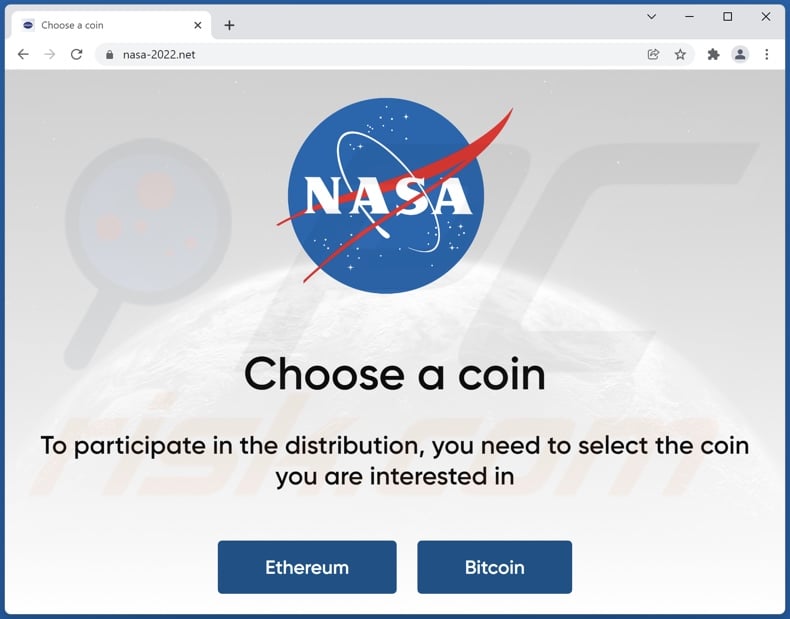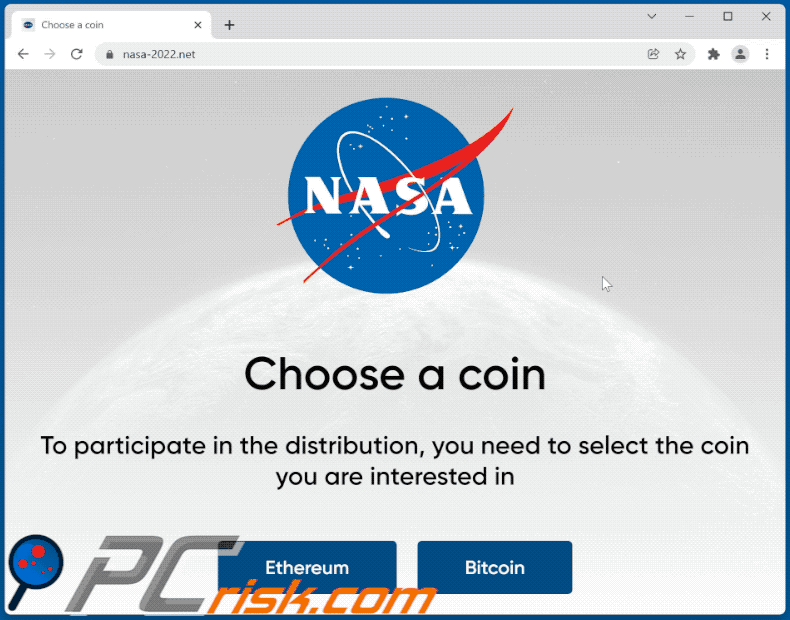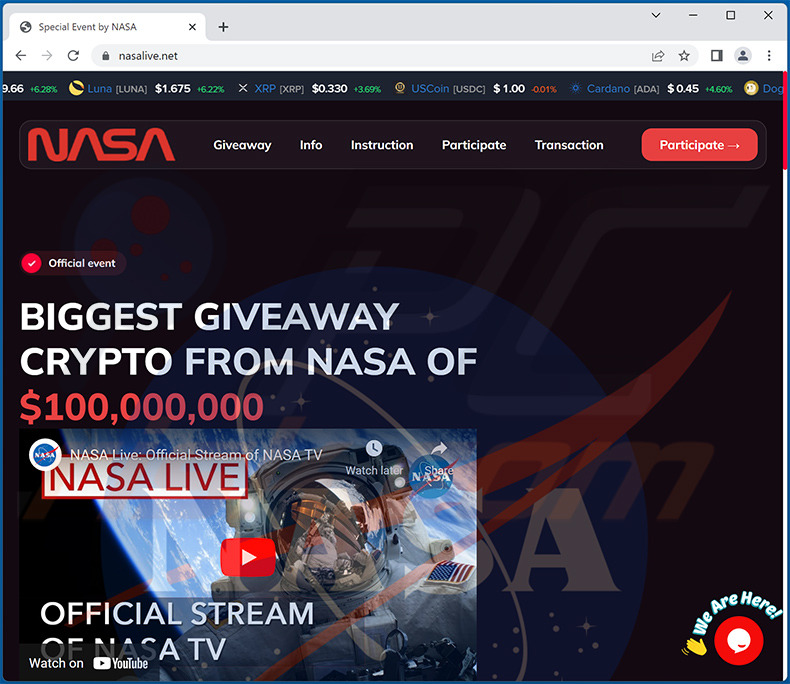Avoiding cryptocurrency scams like "NASA ETH and BTC Giveaway"
Phishing/ScamAlso Known As: NASA ETH and BTC Giveaway scam website
Get free scan and check if your device is infected.
Remove it nowTo use full-featured product, you have to purchase a license for Combo Cleaner. Seven days free trial available. Combo Cleaner is owned and operated by RCS LT, the parent company of PCRisk.com.
What is "NASA ETH and BTC Giveaway"?
When inspecting rogue and deceptive websites, our researchers discovered yet another cryptocurrency giveaway scam. "NASA ETH and BTC Giveaway" is presented as a cryptocurrency mass-adoption scheme. Users are urged to transfer a certain amount of either Ethereum (ETH) or Bitcoin (BTC) cryptocurrencies to the scam - so that they could receive twice as much. In fact, anything transferred to the wallets provided by this scam will be irreversibly lost.

"NASA ETH and BTC Giveaway" scam overview
When our researchers accessed a site promoting the "NASA ETH and BTC Giveaway" scam, the page encouraged to select either ETH or BTC buttons - to indicate which cryptocurrency they were interested in. Clicking either opened a virtually identical page, with the only exception being the size of the sums and the respective cryptocurrency.
The text on this page claimed that this "50.000 ETH / 5.000 BTC Giveaway" is held by Bill Nelson - an American politician and attorney serving as the administrator of NASA (National Aeronautics and Space Administration). It must be emphasized that neither Bill Nelson nor NASA are affiliated or associated with this scam.
The fake giveaway can supposedly be used once, and (depending on the currency of choice) participants are asked to transfer 1ETH to 500ETH (at the time of writing, approximately 2.000 to 1.200.000 USD) or 0.1BTC to 10BTC (~3.000 - 340.000 USD) to the provided cryptowallet address. Users are promised that they will receive twice the amount they had transferred (e.g., 1ETH - 2ETH, 10BTC - 20BTC, etc.).
Before the "double the amount" statement, this scheme also used the phrase "chance to win". Regardless, this is a scam, and so there are no guaranteed returns or any chances of them.
Whatever the sum transferred to "NASA ETH and BTC Giveaway" - it will be lost. Furthermore, since cryptocurrency transactions are difficult/impossible to trace, they are essentially irreversible. Therefore, by trusting this scam, victims will experience financial losses.
| Name | NASA ETH and BTC Giveaway scam website |
| Threat Type | Phishing, Scam, Social Engineering, Fraud |
| Fake Claim | Scam promises to double the cryptocurrency transferred to it. |
| Disguise | Scam is disguised as a mass-adoption effort created by Bill Nelson. |
| Related Domains | nasa-2022[.]net, nasalive[.]net |
| Detection Names (nasa-2022[.]net) | Netcraft (Malicious), Scantitan (Phishing), Webroot (Malicious), Certego (Suspicious), ESET (Suspicious), Full List Of Detections (VirusTotal) |
| Distribution methods | Compromised websites, rogue online pop-up ads, potentially unwanted applications. |
| Damage | Loss of sensitive private information, monetary loss, identity theft, possible malware infections. |
| Malware Removal (Windows) |
To eliminate possible malware infections, scan your computer with legitimate antivirus software. Our security researchers recommend using Combo Cleaner. Download Combo CleanerTo use full-featured product, you have to purchase a license for Combo Cleaner. 7 days free trial available. Combo Cleaner is owned and operated by RCS LT, the parent company of PCRisk.com. |
Cryptocurrency-centered scam examples
We have researched many cryptocurrency-themed scams. "UFO giveaway", "PROT Giveaway", "Ripple Giveaway", and "Doge Giveaway" are some examples of those akin to "NASA ETH and BTC Giveaway"; "Wallet Access Connect", "Sync Wallets", "Trust Wallet scam" - phishing scams that target digital wallet log-in credentials. Due to how widespread various scams are online, we strongly advise exercising caution when browsing.
How did I open a scam website?
Our researchers encountered a "NASA ETH and BTC Giveaway" scam-promoting websites through others that employ rogue advertising networks. However, deceptive sites can also be accessed via mistyped URLs or redirects caused by spam browser notifications/ intrusive ads. These pages can be force-opened by installed adware as well.
How to avoid visiting scam websites?
Untrustworthy websites are commonly endorsed by those that use rogue advertising networks. Therefore, we advise against visiting/using Torrenting, illegal streaming/downloading, and other sites offering dubious or copyright-breaking services.
Online scams are also promoted through ads hosted on suspicious websites, displayed by adware, or delivered as browser notifications. The latter can be avoided by refusing to permit webpages to display notifications (i.e., clicking "Block", "Block Notifications", etc.); ignoring these requests is also a viable tactic.
Adware can deliver scam-pushing adverts or force-open such sites. To prevent this software from infiltrating the system, we recommend downloading content only from official and verified sources. Additionally, installation processes must be approached with caution (e.g., read terms, use "Custom/Advanced" settings, opt-out of additions, etc.).
It is paramount to have a reputable anti-virus installed and kept updated. Security programs must be used to run regular system scans and to remove detected threats. If your computer is already infected, we recommend running a scan with Combo Cleaner Antivirus for Windows to automatically eliminate all threats.
Text presented in "NASA ETH and BTC Giveaway" scam:
Choose a coin
To participate in the distribution, you need to select the coin you are interested in
Ethereum Bitcoin
50.000 ETH / 5.000 BTC Giveaway by Bill Nelson
NASA believe that blockchain will make the world more fair. To speed up the process of cryptocurrency mass adoption, We decided to run 50 000 ETH / 5.000 BTC giveaway.
The appearance of "NASA ETH and BTC Giveaway" scam (GIF):

Another example of NASA-themed crypto giveaway scam website:

Text presented within:
Giveaway Info Instruction Participate Transaction Participate
Official event
BIGGEST GIVEAWAY
CRYPTO FROM NASA OF $100,000,000During this unique event we will give you the opportunity to get 1,000 BTC or 10,000 ETH. Have a look at the rules and don’t miss your chance! You can only participate once!
Participate
Instruction for participateTo make a transaction you can use any wallet or exchange to participate!
Send the desired number of coins to the special address below.
Once we receive your transaction, we will immediately send the requested amount back to you.
You can only take part in our giveaway once. Hurry up!
Rules & Information
About giveawayWe believe that Blockchain will make the world more fair. To speed up the process of cryptocurrency mass adoption we decided to run a 1,000 BTC & 10,000 ETH giveaway for all crypto holders!
How to participate ?
To participate you just need to send from (0.1 BTC to 30 BTC) or (0.5 ETH to 500 ETH) to the contribution address and we will immediately send you back (0.2 BTC to 60 BTC) or (1 ETH to 1,000 ETH) (x2) to the address you sent it from.
Count your prize
In order to calculate your prize, you can use the built-in calculator on our website
Instant automatic malware removal:
Manual threat removal might be a lengthy and complicated process that requires advanced IT skills. Combo Cleaner is a professional automatic malware removal tool that is recommended to get rid of malware. Download it by clicking the button below:
DOWNLOAD Combo CleanerBy downloading any software listed on this website you agree to our Privacy Policy and Terms of Use. To use full-featured product, you have to purchase a license for Combo Cleaner. 7 days free trial available. Combo Cleaner is owned and operated by RCS LT, the parent company of PCRisk.com.
Quick menu:
- What is NASA ETH and BTC Giveaway scam website?
- How to identify a pop-up scam?
- How do pop-up scams work?
- How to remove fake pop-ups?
- How to prevent fake pop-ups?
- What to do if you fell for a pop-up scam?
How to identify a pop-up scam?
Pop-up windows with various fake messages are a common type of lures cybercriminals use. They collect sensitive personal data, trick Internet users into calling fake tech support numbers, subscribe to useless online services, invest in shady cryptocurrency schemes, etc.
While in the majority of cases these pop-ups don't infect users' devices with malware, they can cause direct monetary loss or could result in identity theft.
Cybercriminals strive to create their rogue pop-up windows to look trustworthy, however, scams typically have the following characteristics:
- Spelling mistakes and non-professional images - Closely inspect the information displayed in a pop-up. Spelling mistakes and unprofessional images could be a sign of a scam.
- Sense of urgency - Countdown timer with a couple of minutes on it, asking you to enter your personal information or subscribe to some online service.
- Statements that you won something - If you haven't participated in a lottery, online competition, etc., and you see a pop-up window stating that you won.
- Computer or mobile device scan - A pop-up window that scans your device and informs of detected issues - is undoubtedly a scam; webpages cannot perform such actions.
- Exclusivity - Pop-up windows stating that only you are given secret access to a financial scheme that can quickly make you rich.
Example of a pop-up scam:

How do pop-up scams work?
Cybercriminals and deceptive marketers usually use various advertising networks, search engine poisoning techniques, and shady websites to generate traffic to their pop-ups. Users land on their online lures after clicking on fake download buttons, using a torrent website, or simply clicking on an Internet search engine result.
Based on users' location and device information, they are presented with a scam pop-up. Lures presented in such pop-ups range from get-rich-quick schemes to fake virus scans.
How to remove fake pop-ups?
In most cases, pop-up scams do not infect users' devices with malware. If you encountered a scam pop-up, simply closing it should be enough. In some cases scam, pop-ups may be hard to close; in such cases - close your Internet browser and restart it.
In extremely rare cases, you might need to reset your Internet browser. For this, use our instructions explaining how to reset Internet browser settings.
How to prevent fake pop-ups?
To prevent seeing pop-up scams, you should visit only reputable websites. Torrent, Crack, free online movie streaming, YouTube video download, and other websites of similar reputation commonly redirect Internet users to pop-up scams.
To minimize the risk of encountering pop-up scams, you should keep your Internet browsers up-to-date and use reputable anti-malware application. For this purpose, we recommend Combo Cleaner Antivirus for Windows.
What to do if you fell for a pop-up scam?
This depends on the type of scam that you fell for. Most commonly, pop-up scams try to trick users into sending money, giving away personal information, or giving access to one's device.
- If you sent money to scammers: You should contact your financial institution and explain that you were scammed. If informed promptly, there's a chance to get your money back.
- If you gave away your personal information: You should change your passwords and enable two-factor authentication in all online services that you use. Visit Federal Trade Commission to report identity theft and get personalized recovery steps.
- If you let scammers connect to your device: You should scan your computer with reputable anti-malware (we recommend Combo Cleaner Antivirus for Windows) - cyber criminals could have planted trojans, keyloggers, and other malware, don't use your computer until removing possible threats.
- Help other Internet users: report Internet scams to Federal Trade Commission.
Frequently Asked Questions (FAQ)
What is an online scam?
Online scams are schemes promoted on the Internet, and their goal is to entice/scare users into performing specific actions. For example, they can trick victims into making bogus transactions, disclosing private data (e.g., usernames/passwords, credit card numbers, etc.), downloading/installing (likely untrustworthy or malicious) software, and so forth.
What is the purpose of online scams?
The purpose of all scams is to generate revenue at victims' expense. To elaborate, scammers can profit from funds received through deception, by abusing/selling private information, promoting software, distributing malware, etc.
I have sent cryptocurrency to the address presented in the "NASA ETH and BTC Giveaway" scam, can I get my money back?
No, cryptocurrency transactions are practically untraceable, so they cannot be reversed.
Why do I encounter online scams?
Online scams are run on various rogue sites, which are rarely accessed intentionally. Most users enter such webpages via mistyped URLs or redirects caused by pages that use rogue advertising networks, spam browser notifications, intrusive advertisements, or installed adware.
Will Combo Cleaner protect me from online scams?
Combo Cleaner is designed to scan visited websites, and it can detect rogue, scam-promoting, and malicious ones. In addition to issuing warnings when such sites are entered, Combo Cleaner can restrict all further access to them.
Share:

Tomas Meskauskas
Expert security researcher, professional malware analyst
I am passionate about computer security and technology. I have an experience of over 10 years working in various companies related to computer technical issue solving and Internet security. I have been working as an author and editor for pcrisk.com since 2010. Follow me on Twitter and LinkedIn to stay informed about the latest online security threats.
PCrisk security portal is brought by a company RCS LT.
Joined forces of security researchers help educate computer users about the latest online security threats. More information about the company RCS LT.
Our malware removal guides are free. However, if you want to support us you can send us a donation.
DonatePCrisk security portal is brought by a company RCS LT.
Joined forces of security researchers help educate computer users about the latest online security threats. More information about the company RCS LT.
Our malware removal guides are free. However, if you want to support us you can send us a donation.
Donate
▼ Show Discussion